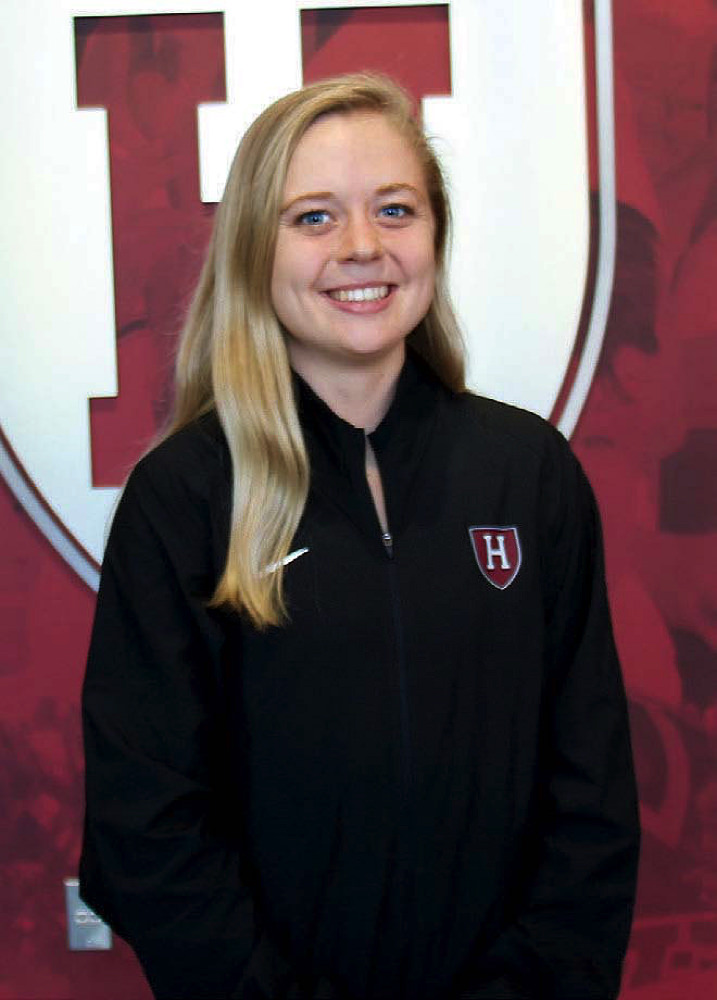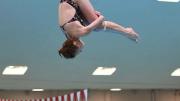Georgina Milne ’21 stands straight, preparing to execute a daunting front three-and-a-half tuck. One of the country’s best collegiate divers from the three-meter springboard, she knows the seven half-rotations will take unwavering focus, tight execution, and serious core strength.
Milne focuses on the little things. As she finishes her hurdle to the front of the board, she points her arms straight up—mindful of her tendency to arch them forward. She aims to leap from the sweet spot where she’ll achieve the ideal balance of spring and stability. She tightens her core and leaps into the air with her toes pointed, flying up and away from the board and down toward the water, hoping to enter with a clean puncture.

Georgina Milne
Photograph courtesy of Harvard Athletic Communications
But it’s all in her head. Milne, forced off campus by coronavirus, does all this in her living room. In Concord, North Carolina, about 800 miles from Cambridge, she visualizes the dive in slow motion, imagining each grab, twist, and extension. In March, she had been preparing for the NCAA swimming and diving championship. With the meet canceled and facilities closed, her routine has changed. Instead of heading out to a pool, she spends time at the one in her head.
Visualization has always been key to Milne’s training. Unlike many divers who arrive at the sport from a gymnastics background, where aerial flipping and tumbling are routine, Milne jumped straight to the water. As a second-grader in New Albany, Ohio, at her once-a-week afterschool diving program, she could wrap her mind around the pipe jumps, tuck jumps, and dives, but the front flip seemed impenetrable. “I just remember being so terrified,” she says. “I think the fourth- and fifth-graders were more aware of their bodies and able to figure out how to do it. I think my issue was I just had no idea.”
When she was eight, she and her family moved to Seattle, where she joined a new club. Soon, the front flip was a piece of cake, and Milne had a new challenge: the front one-and-a-half. This time, instead of landing feet first, she’d have to kick out and reach toward the water after a mid-air rotation.
Her coach, Chris Miller, had a way of making these challenges fun. “I think it was Chris who made me fall in love with the sport,” she says. “Any coach wants you to get better, but he had this way of making us feel really good about trying new things.” But for this daunting move, a nine-year-old Milne felt she needed an extra push. Frustrated, she complained to her mother about her struggles.
“Well, what do you think would help you?” her mom asked.
“I just wish Chris would yell at me more!” Milne responded.
“And so the next day, my mom went up to him and said, ‘I have a strange request,’” Milne remembers. “‘My daughter wants you to be harder on her.’”
Some of the more high-tech diving organizations have fancy equipment that helps divers test new moves—trampolines, harnesses, pulley systems for mid-air acrobatics. Seattle’s didn’t, so Miller had the team practice a lot of visualization and “lead-ups.” If Milne was trying to learn a front one-and-a-half, she could think through the familiar motion of the front flip, and then imagine a routine front dive. On the diving board, she’d do both separately, repeatedly. Then she’d put them together.
As things turned out, Miller didn’t have to yell for Milne to nail the front one-and-a-half. With her love for the sport growing, it was only a matter of time. “There’s kind of this rush you get when you’re diving and you try a dive you’ve never done before,” she says. “You just get these butterflies in your stomach…. And I think I just really loved that feeling.”
By the time Milne arrived in Dallas at age 11, her diving foundation was strong. Though her father’s retail architecture job spurred the move, the family landed close to GC Divers, one of the best clubs in the country. With more intense training and better facilities, Milne quickly improved. She was devastated when her family had to move again, leaving her reigning national championship team as high school began, but they returned to New Albany, near the club that had finished second. “Honestly, at this point, I feel like I was able to stick with diving because of the circumstances of luck,” Milne explains. “Kind of always moving to the next best thing.” The following year, her new team would win the national championship.
In high school, practicing five or six days a week, sometimes for more than five hours at a time, she began qualifying for regionals and nationals. The only problem was, she wasn’t a U.S. citizen. (Her parents are British and South African.) She could compete at regionals, but nothing beyond. Instead, she competed in the 2014 South African junior national championships, qualifying for the junior world championships. She got her citizenship in 2015, but again competed for South Africa in the 2016 World Junior Diving Championships.
But when Milne arrived at Harvard, her progression hit a hitch. For most of her life, the focus had been solo: she had been part of a team, but the pressure didn’t extend beyond herself. “But coming to Harvard, from the get-go it was like, ‘You are a part of something bigger than yourself,’” she explains. “And, ‘You have a role to play on this team.’” Milne couldn’t quite figure out how the team’s energy played into her performance. She knew her scores affected how the team placed, but she continued approaching her dives individually. At meets, she could hear her teammates cheering, but instead of channeling the energy toward her dives, she let it turn into excess pressure. With an overactive mind, executing proved difficult. Between the team adjustment and transition to campus life, she felt lost, performing poorly and almost missing out on a team spot at the 2018 Ivy championships. “It was kind of a blur to me. I just had no idea what was going on,” Milne says. “I sort of didn’t put enough of my mental energy into the sport.”
Her sophomore year, things improved. She began to appreciate the team element—the high fives, the team celebrations. As she approached the board for a dive, she would look at her teammates and try to feed off their energy and support. When things clicked mid-season, Milne went on a tear, eventually earning a berth at the 2019 NCAA championships—a result that would have shocked anyone who had seen her perform freshman year.
Her 2020 season was even better. The new diving coach, Matt O’Neill, approached the sport with a level of joy that Milne hadn’t seen before. “Sometimes, at the end of practice, he’d say, ‘Okay, go spend five minutes doing whatever you want, but whatever it is, it needs to be fun,’” Milne says. Surrounded by a supportive team and thriving on the energy of her new coach, she won the Ivy title on three-meter board and placed fourth at the NCAA Zone A Diving Championships. She’d been happy just to qualify for the NCAA championships in 2019. In 2020, she wanted to make a statement.
She wouldn’t get the chance. Coming home from West Virginia after the Zone A Championships in Morgantown, the coaches received an email from Harvard athletics letting them know they couldn’t compete at NCAAs. Milne was heartbroken. “But seeing how hard it was for Matt to tell us, I thought, ‘It’s okay,’ ” Milne says. “It’s something we can’t control.” The following day, the meet was canceled.
At home in North Carolina, Milne chooses not to focus on what’s been taken away from her: her gym, her pool, her teammates. Instead, lying on her living-room floor, mentally completing dives she doesn’t have the chance to try, she’s trying to master the art of visualization. When pools reopen and she gets back on the diving board, she’ll be ready for what’s next. She can picture it.









